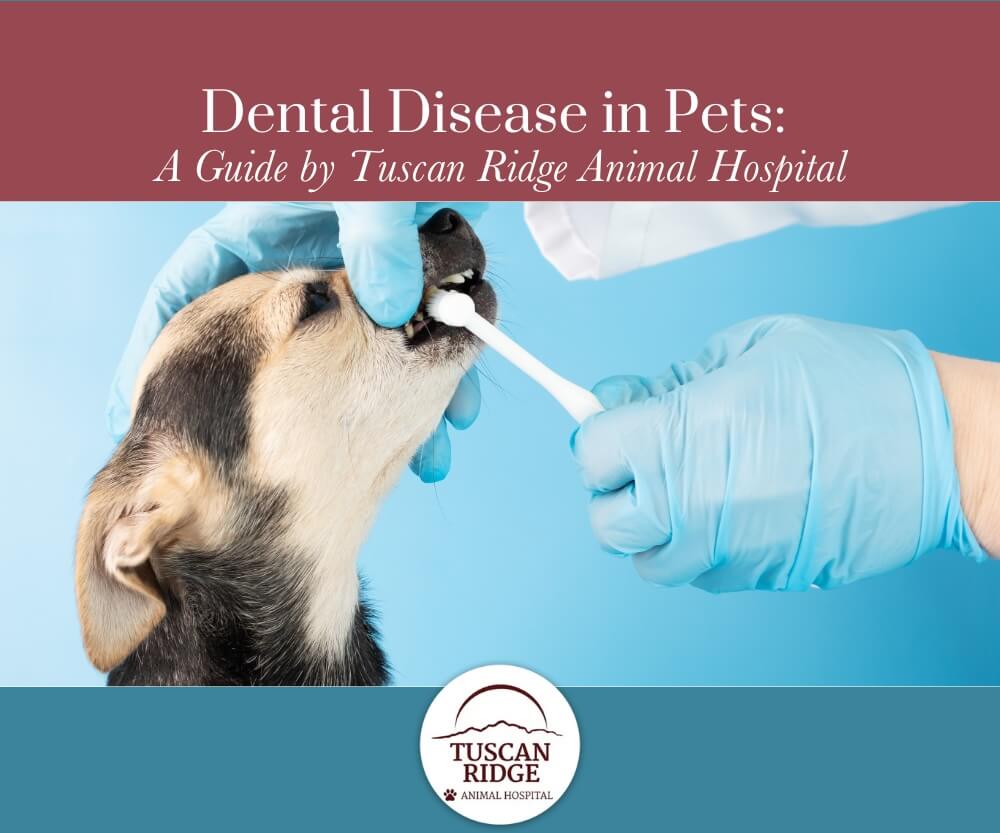 Dental disease is a common yet often overlooked issue in pets. At Tuscan Ridge Animal Hospital, we are committed to providing comprehensive care to ensure the health and well-being of your furry companions. In this blog post, we will explore the importance of dental health in pets, the signs and symptoms of dental disease, preventive measures, and treatments available. Additionally, we have included a comprehensive Q&A section to address common concerns pet owners may have about their pet’s dental health.
Dental disease is a common yet often overlooked issue in pets. At Tuscan Ridge Animal Hospital, we are committed to providing comprehensive care to ensure the health and well-being of your furry companions. In this blog post, we will explore the importance of dental health in pets, the signs and symptoms of dental disease, preventive measures, and treatments available. Additionally, we have included a comprehensive Q&A section to address common concerns pet owners may have about their pet’s dental health.
The Importance of Dental Health in Pets
Just like humans, pets require regular dental care to maintain their overall health. Poor dental hygiene can lead to periodontal disease, which can cause pain, tooth loss, and even systemic health issues affecting the heart, liver, and kidneys. Ensuring your pet’s teeth and gums are healthy is crucial for their quality of life and longevity.
Signs and Symptoms of Dental Disease in Pets
Dental disease can manifest in various ways, and it’s important for pet owners to be vigilant in identifying these signs:
- Bad Breath: Persistent bad breath can indicate underlying dental issues.
- Tartar and Plaque Buildup: Yellow or brown deposits on the teeth.
- Red or Swollen Gums: Inflammation and bleeding of the gums.
- Difficulty Eating: Reluctance to eat or dropping food from the mouth.
- Excessive Drooling: Increased saliva production.
- Loose or Missing Teeth: Teeth that are loose or have fallen out.
- Pawing at the Mouth: Pets may paw at their mouth due to discomfort.
Preventive Measures for Dental Health
Preventing dental disease in pets involves regular care and attention. Here are some steps you can take:
- Regular Brushing: Brush your pet’s teeth daily with pet-specific toothpaste.
- Dental Chews and Toys: Provide dental chews and toys designed to reduce plaque and tartar.
- Healthy Diet: A balanced diet supports overall dental health.
- Routine Veterinary Check-Ups: Schedule regular dental check-ups and cleanings with your veterinarian.
Treatments for Dental Disease
If your pet is diagnosed with dental disease, various treatments are available depending on the severity:
- Professional Cleaning: Veterinary dental cleaning involves dental x-rays, scaling and polishing the teeth to remove plaque and tartar.
- Tooth Extractions: In severe cases, removing damaged or infected teeth may be necessary.
- Medications: Antibiotics and pain relief medications may be prescribed to treat infections and manage pain.
Comprehensive Q&A Section
Q1: How often should I brush my pet’s teeth?
A1: Ideally, you should brush your pet’s teeth daily. However, if that’s not possible, aim for at least 3-4 times a week.
Q2: Can I use human toothpaste for my pet?
A2: No, human toothpaste contains ingredients that can be harmful to pets. Always use toothpaste specifically formulated for pets.
Q3: What are the risks of untreated dental disease in pets?
A3: Untreated dental disease can lead to pain, tooth loss, and infections that can spread to other parts of the body, including the heart, liver, and kidneys.
Q4: Are there any signs of dental disease that are not related to the mouth?
A4: Yes, some signs such as lethargy, decreased appetite, and weight loss can be indirectly related to dental disease.
Q5: What can I do if my pet resists tooth brushing?
A5: Start slowly and be patient. Use positive reinforcement and consider dental chews and toys as supplemental dental care. Consult your veterinarian for additional tips and alternatives.
Q6: How often should my pet have a professional dental cleaning?
A6: Most pets benefit from a professional dental cleaning once a year. However, your veterinarian may recommend more frequent cleanings based on your pet’s specific needs.
Q7: Can diet impact my pet’s dental health?
A7: Yes, certain diets and specially formulated dental diets can help reduce plaque and tartar buildup. Consult your veterinarian for dietary recommendations.
Q8: What should I expect during a veterinary dental cleaning?
A8: A veterinary dental cleaning involves a thorough examination, scaling to remove plaque and tartar, polishing, and sometimes dental X-rays to assess the health of the teeth and gums.
At Tuscan Ridge Animal Hospital, we are dedicated to providing the highest standard of dental care for your pets. Regular dental check-ups and preventive care are essential in ensuring your pet leads a healthy and happy life. If you have any concerns about your pet’s dental health, please do not hesitate to contact us for an appointment.
Conclusion
Maintaining your pet’s dental health is vital for their overall well-being. By staying informed and proactive, you can help prevent dental disease and ensure your furry friend enjoys a long, healthy life. Trust Tuscan Ridge Animal Hospital to be your partner in your pet’s dental care journey.
For more information or to schedule a dental check-up, please visit our website or call us today.
